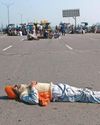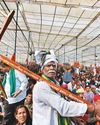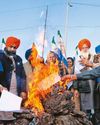
IN the last week of November and the first of December, following what seemed to be a prolonged hiatus from paramilitary operations, the Syrian rebel group Hay'at Tahrir al-Sham (HTS) launched an offensive against President Bashar al-Assad's 24-year oppressive regime in Syria, reaching Damascus, the national capital, on December 8. Assad's fall was the realisation of the Syrian people's long-held aspiration.
They have endured approximately 55 years of rule characterised by oppression, humiliation and arrogance. During this period, the majority of state institutions were subjugated to serve a singular family, overseen by enforcers whose primary responsibility has been to stifle any dissenting voices—be it children, women or the elderly.
There existed neither space for residents or recognition of citizens' right to live with dignity. The policy was to keep people entrenched in their daily struggle for basic means of survival, while the revenues from our natural resources were redirected into Swiss and Austrian financial institutions. All of this transpired under the guise of a fabricated resistance and clandestine agreements with the occupying adversary, aimed at maintaining power for as long as possible until that inevitable moment arrives—a fate anticipated for every foolish and arrogant dictator: their eventual downfall.
Today, Syria remains sovereign, and it will continue to do so indefinitely. The implications of 'sectarianism' are profoundly alarming when it becomes a central element of power, especially in a nation like Syria that has historically been recognised as 'the beating heart of Pan-Arabism'.
This story is from the January 11, 2025 edition of Outlook.
Start your 7-day Magzter GOLD free trial to access thousands of curated premium stories, and 9,000+ magazines and newspapers.
Already a subscriber ? Sign In
This story is from the January 11, 2025 edition of Outlook.
Start your 7-day Magzter GOLD free trial to access thousands of curated premium stories, and 9,000+ magazines and newspapers.
Already a subscriber? Sign In

Between Life, Death and Protest
The strain of sustaining a long protest is evident among farmers at Khanauri, but the sense of community remains strong

Protest 2.0
Farmers still have hopes from their leaders, but time is running out. The enemies, in the meanwhile, are sharpening their weapons

Trajectory of Nowhere
In the context of space and time, who are we humans and do we even matter?

All of God's Men
THE ongoing Maha Kumbh at Prayagraj is a spectacle, a photo op, and an emotion and manifestation of the mixing of spirituality and faith.

Embers Rekindled
While the recent death by suicide of a farmer has rendered the mood sombre at Shambhu border, the protests have picked momentum at the call of the unions

Time for Course Correction
What the protest by Punjab's landed peasantry tells us about the state's economy and society

The Untouchable
The ideological chasm between Ambedkar's vision and the Hindutva worldview remains irreconcilable

Frontliners
A day in the life of women protesting at Shambhu border

The Farmer-Composing Antagonist
Farmer leader Jagjit Singh Dallewal has been on a fast-unto-death at Khanauri border to pressurise the government to fulfil its promises to the farming community

Till Death Do Us Part
Jagjit Singh Dallewal has reinforced how a fast unto death can serve as a warning and an appeal to the public and the government